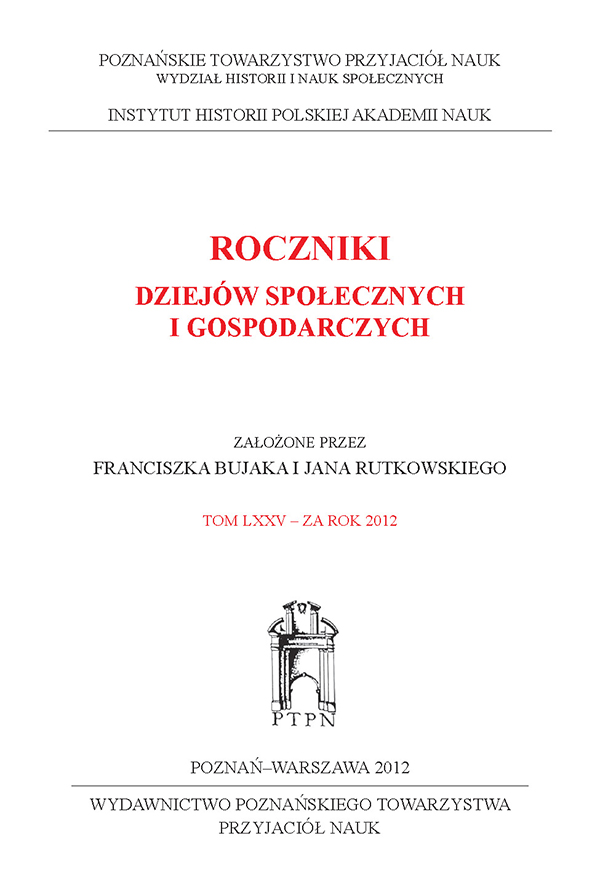Wiatraki na Żuławach w pierwszej połowie XV w.
DOI:
https://doi.org/10.12775/RDSG.2012.02Abstrakt
Windmills in the Żuławy Region during the First Half of the Fifteenth Century
(Summary)
Studies on the living conditions of the rural population and the organisation of agriculture in the Middle Ages have a long tradition. Some of the issues examined include mills in the State of the Teutonic Order. Other publications consider the specific nature of the Żuławy region under the Teutonic Order and the Polish-Lithuanian Commonwealth. This article focuses on reconstructing the significance of windmills for the mill economy in this area. The mills within the Teutonic State were supervised by a number of administrative units. The northern part of Gdańsk Żuławy (known in the Middle Ages as Stüblau (in Pol. Steblewskie or Żuławy Małe) was administered by the forestry office of the Danzig (Gdańsk) commandry, the strip of land between the Vistula and the River Mottlau (Motława) was governed by a Vogt whose seat was in Herrengrebin (Grabiny Zameczek) itself under the commandry of Marienburg (Malbork), while the southern part was supervised by the Vogt of Dirschau (Tczew). Gross Werder (Great Żuławy) was administered by the commandry of Marienburg, and Fischauer Werder (Fiszewskie Żuławy) – by the Komtur (commander) of Elbing (Elbląg) and Christburg (Dzierzgoń). The different principles of administering these regions resulted predominantly from the local water conditions and the need for the farmland’s constant drainage. One of the elements of the region’s specificity was the organisation of flourmilling, which owing to geographical conditions could not be based on a network of water mills, as was the case elsewhere. Water mills were therefore replaced by windmills, which became a prominent element of Żuławy’s milling industry in the Middle Ages, perhaps even in the first half of the fourteenth century, and continued to play this role in successive centuries. The data quoted clearly show that windmills were the foundation of the milling industry in the Scharpau (now: Szkarpawa) region and played a significant role in Stüblau, where the Order owned one water mill in Herrengrebin. It would seem that they were also of fundamental significance in the Vogtei of Leske (Laski) and the area under the Pfl eger of Lassowitz (Lasowice) and Montau (Mątowy). In the territory under the Vogt of Stuhm (Sztum) the mills fulfilled auxiliary functions. The mills in question subsequently functioned not only as flour mills, associated with farm production, but also helped drain farmland threatened by flooding. They continued to fulfil this role until the early 1900s, and their subsequent destruction and ensuing absence in the landscape were accelerated by the destruction of mounds by the fleeing Germans at the end of the war, as well as the profound transformations which affected all domains of social life in this area following World War II. Owing to the specific local conditions, mills were usually erected on the same sites as they had been in the Middle Ages; only the method of their construction changed (early modern novelties included the Dutch mills). In subsequent years, mills for land drainage were used on a larger scale alongside grist mills. Unfortunately, only two such mills have survived: a post mill in Schönbaum (Drewnica) and a Dutch mill in Palschau (Palczewo), which are testimony of the great diversity of the local material culture and organisation of the rural economy in past centuries.
Pobrania
Opublikowane
Jak cytować
Numer
Dział
Statystyki
Liczba wyświetleń i pobrań: 558
Liczba cytowań: 0



